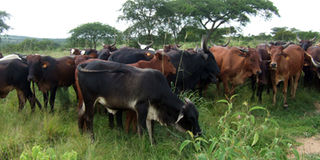Uganda, France link up on agribusiness

Livestock farming is one of the areas that Uganda and France are seeking to cooperate in and establish business partnerships.
What you need to know:
Both Uganda and France have economies in which agriculture plays a significant role. As such investment opportunities are available, so mutually beneficial partnerships can be established to explore them.
The first France-Uganda agribusiness forum was held on December 11-12, in Kampala. It involved representatives of various Ugandan companies and business associations like Private Sector Foundation Uganda. The French delegation was under the umbrella of Adepta, the Association for Development of International Exchanges in Agricultural and Agri-food products and Techniques.
Partnerships
Representatives of the participating French companies aimed at identifying business opportunities in both agriculture and agro-processing. The objective is to share their know-how and to propose technical solutions to challenges in agri-business. Their interests are also in investment or partnerships with Ugandan business in areas such as animal feeds and hygiene, large-scale farming, large scale irrigation, dairy packaging, and industrial preservation equipment, among others.
Bread basket
At the forum, Sophie Makame, France’s ambassador in Uganda, said boosting agricultural productivity will not only satisfy food and nutrition needs of Ugandans but also contribute to employment and enhance livelihoods in rural areas. “Seventy per cent of Ugandans depend on agriculture. The sector is the first of three growth opportunities prioritised in the National Development Plan,” she added.
Describing Uganda as the bread basket of eastern Africa, she said that the country has the potential to reach beyond the region.
At an interactive reception held later, Patrick Bitature, chairperson, Private Sector Foundation Uganda, noted that the agribusiness forum was the result of exchange visits to France where he invited the business community to seek out investment opportunities in Uganda. He also outlined three major factors that the French investors should take note of. One, Uganda has a unique geographical location. Though it is landlocked; there is access to the markets in the neighbouring countries; Rwanda, Burundi, D.R. Congo and South Sudan.
He added: “The other factor is macro-economic stability, which is supported by more than two decades of implementing sound economic policies.” The third is the huge youth population, who with the adequate skills form vast human resource pool.
Boost modernisation
In his remarks, Alain Reocreux, who led the delegation, observed that interaction between French agricultural companies and the Ugandan farming sector will facilitate information and experience sharing.
In particular, this will be on technologies available to boost agricultural modernisation that Uganda is targeting. He, however, noted that technologies change over time and in order to be able to compete, farmers must take them up.
Reocreux added that their goal is to help farmers, who operating at various levels.
If they are small-scale farmers, they want to help them to do what they do in a better way. For example, how to improve the fertility of their livestock and reduce the rate of mortality of their animals so that they can be able to get more from them.
Best practices
“Farmers are able to manage different numbers of cattle. We will help the farmers to look after their animals in the best way possible and reap more profits from their farms,” he said. By doing this, the farmers need to create added value to their farms, for example, they will be able to get milk, yoghurt and cheese so that they can be able to trade these products for themselves.
Reocreux said that the different technologies that they are interested in sharing with Ugandan farmers are in feeds processing. They should be easily available for the farmers. Because farmers work on food security for the people, the only way of doing this is ensuring that their livestock and crops are properly looked after with best practices and technologies available.




